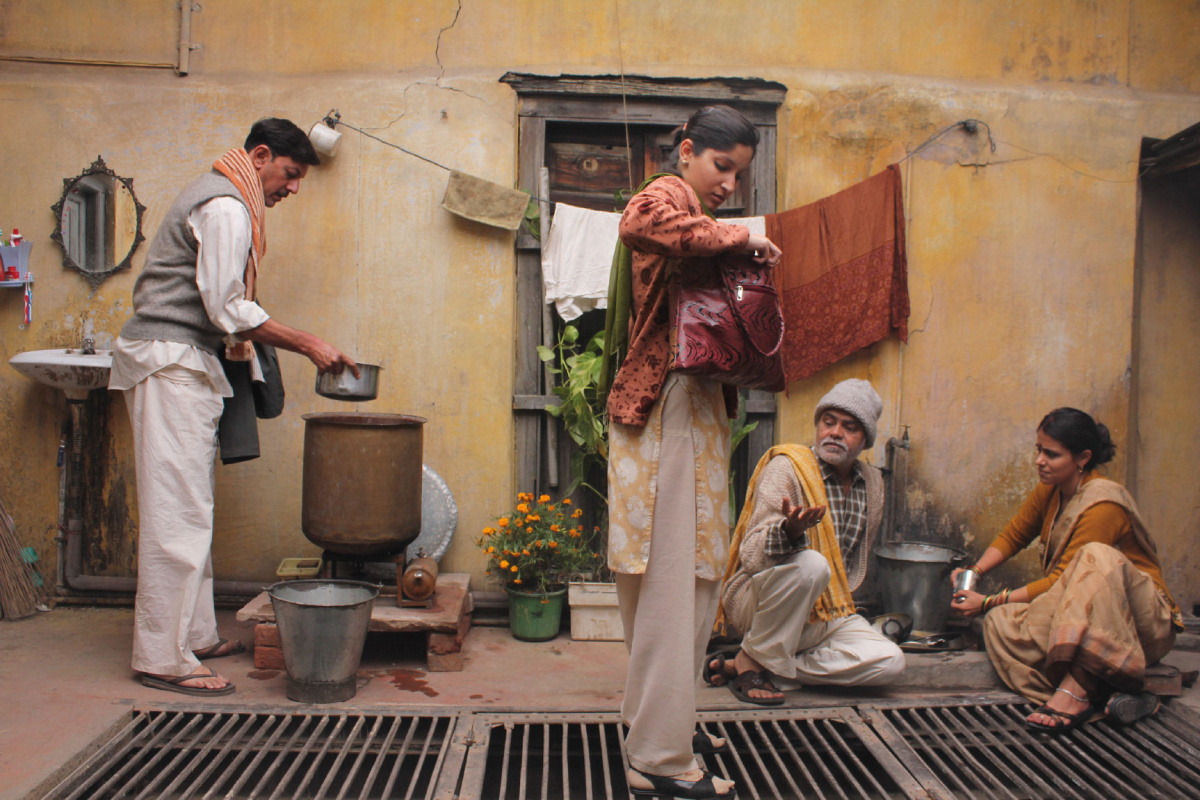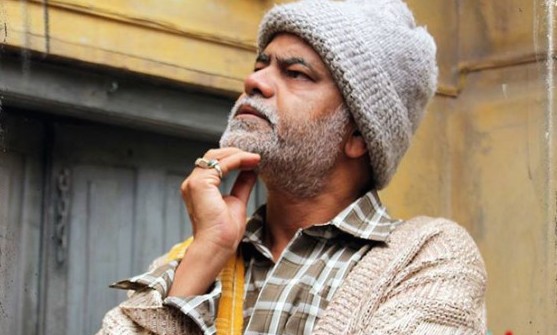By Tanul Thakur
Bauji (Sanjay Mishra) has been left behind. Either he was too slow throughout or others were simply too fast and he just didn’t realize that. This realization dawns on him one night when his wife and other members of the family berate his daughter because she went out to meet her boyfriend. Bauji can probably understand what the fuss is about but not in the way it materializes: His wife hoarsely shouts at her daughter; it also doesn’t help that she’s overtly theatrical and has a dangerous tendency to dish out schmaltzy sermons. Seeing this, Bauji shrinks further into a corner of the bed, hoping the show gets over soon. This is the first time that we see Bauji detaching himself from others physically. This moving away is real. It’s a nice precursor to a change that will happen later on only inside his head. And Kapoor frames these scenes—of Bauji’s disconnect—quite interestingly: the camera, when lingering on Bauji, is not inside the room watching him closely but is on the courtyard, a fair distance away. Bauji is, or has become, a stranger to his own family. This exact framing appears, again, in one of the subsequent scenes shot in the house, and not only that, even when Bauji is speaking to his manager in the office, the camera first observes him from a distance—outside the room—before resting close to him.
And even though he probably wants to, Bauji can’t just break away. He has familial responsibilities: he needs to get his daughter married; his wife and son depend on him. But he does begin to seek himself out. Bauji says he won’t believe anything on hearsay. And although this thought, or wish, appears simplistic on the surface, it’s anything but that. Our conditioning begins to define us in ways we seldom fathom or, worse, question. So who are we in such a case—largely a by-product of our environs? Do we even exist when others cease to matter? Bauji sums up his new philosophy by explaining it thus: “Everyone has their own truth. This is my truth. It could be different from yours.” It’s an interesting point of view that the film, or Bauji, advocates: At one level, it is about understanding yourself better, what things matter to you and what don’t, knowing what’s extraneous in your life so you can stop fretting over them and only concentrate on the essential specifics. But on the other hand, it is also about co-existing with others, letting your truth live with someone else’s, especially if you are like Bauji who’s married and has certain expectations to fulfill. For instance, the scene where Bauji trusts his own truth and decides that his daughter’s marriage invitation card should be minimalistic and stripped off anything superfluous. But in the next scene, we see his daughter lashing out at him because she doesn’t approve of his choice. According to Bauji’s new lexicon, she has all the right to for it’s her truth. It’s a little chaotic set up. When do you know which truths you can compromise on and which truths to hold on to? When do the people around become larger than your own truths? Are they allowed to be? I am not sure. That’s a question that’s up to Bauji to answer.
When Bauji is in the first stage of his transformation—of believing only those things he has experienced—he makes some beautiful, insightful observations. For instance, when Bauji eats a prasad offered to him, he says it’s merely a sweet, nothing more. It’s a lovely testament to living in the now. However, when Bauji becomes pedantic and begins questioning laws of mathematics and Physics, you can’t help but see a forced extrapolation of this new set of belief to every facet of life. For instance, throughout the film, I wondered would Bauji’s new avatar allow him to enjoy things that hinge on the figurative, rather on the literal? You can keep extending this analogy to various other fields and it can, understandably, get a little tedious. Thankfully, the film doesn’t and moves onto his another avatar, where he stops speaking. He sits in one corner of the room and motions with his hands, which seem to say, “By not talking, I will experience even more.” You do understand what he’s trying to convey. Here’s a guy who truly wants to experience things. But how can he when he’s engulfed by noise and people all around?
It’s not easy to delineate these conundrums on a motion picture. You can perhaps write a book on these existential concerns—in a voice that relies on stream of consciousness—even a note, but how truly can you capture the life of a guy whose problems don’t centre around others but him? And, again, these questions would have been a little easy to deal with or even answer had Bauji been alone or free from any responsibility. But, even then, is loneliness the absolute answer to Bauji’s uneasiness? Questions like these keep floating throughout the film. And, perhaps, they are perennially present because Bauji is looking for an answer. That he hasn’t resigned to the fact that life doesn’t lend itself to facile explanations. That the exercise of pining down the definition of pointlessness is, ironically, pointless in itself.
At its finest, Ankhon Dekhi mulls over its two prime concerns, and both of them can be distilled into widely discussed philosophical questions: the first one, where Bauji refuses to believe anything that he hasn’t seen or experienced, reminds one of the question: “If a tree falls in a forest and no one is around to hear it, does it make a sound?” It makes you question what’s real and what’s not, and also the concept of perception. And it’s a question that begs to be considered because it tries to understand whether things can also happen in isolation or are they of any importance only if their existence has a bearing—no matter how big or small—on someone. Here, the actual act is rendered peripheral, what’s important is the receiver. Also I hope I don’t sound like I am even attempting an answer because I am not. Most philosophical questions give rise to further questions or discussions; they seldom demand answers. The film’s second concern centres on absurdism. And I warmed up to this question a little more than the first one because Kapoor doesn’t try to concretize it through any device—dialogues, visual metaphors, etc. In fact, the second concern of the film is a subset of its first concern. It’s only when Bauji tries to answer and cogitate over every question that his new obsession throws at him, that he slowly inches closer to the fact that there are no answers. We aren’t sure what Bauji makes of this new knowledge, or if he’s even realized this. Absurdist philosophy says that the pursuit of meaning in a meaningless world can be realized by one of these three things: accepting a spiritual or a religious idea (but the new Bauji refuses to toe the line there, so this no longer remains an option for him); acceptance of the absurd (embracing the fact that all attempts to find a meaning is futile); suicide (escaping existence and hence the questions it throws at you). The last two options are not explicitly talked about in the film but we know, given Bauji’s current state, he will have to choose between the two.
Unlike most films, Ankhon Dekhi doesn’t unfold in the way that allows you to simplistically slot it into ‘good’, ‘bad’, ‘engaging’, or their many variants. You can’t even root for its central character, or like him, or loathe him. None of that actually matters. It’s a character’s journey to find his niche, which never really reveals itself. But what the film does tell us, and something even Bauji realizes is the small differences we all put up with people around. Towards the end of the film, when Bauji is taking a stroll in the forest with his wife, they strike up a conversation about how beautiful this place is. The conversation doesn’t play out to underscore how different they are, but that’s what it ends up showing: Both of them are trying to steer this conversation somewhere else. And no one is refuting the other. In the final scene of the film, when Bauji is standing on the edge of the cliff, the camera observes him from a distance, similar to how it looked at him in the beginning of the film. But then the camera finally zooms onto his face, when Bauji is in mid-air. Why? Because according to Bauji: “Yeh yatharth hai (This is real).”
[Read more of the award-winning author’s work on his blog: https://tanulthakur.wordpress.com]








Leave A Comment
You must be logged in to post a comment.